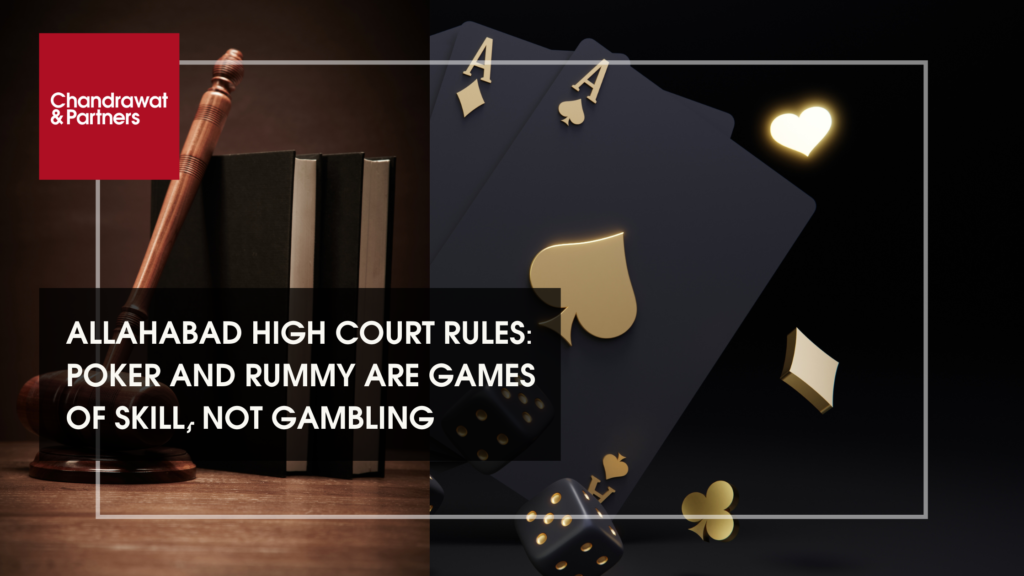Home > Recent Judgements > Allahabad High Court Rules: Poker And Rummy Are Games Of Skill, Not Gambling
Sept 20, 2024

ALLAHABAD HIGH COURT RULES: POKER AND RUMMY ARE GAMES OF SKILL, NOT GAMBLING
In a significant ruling, the Allahabad High Court recently reaffirmed that recreational gaming activities such as poker and rummy are games of skill rather than gambling. This decision adds to the growing body of legal opinions classifying these card games as skill-based, offering clarity to those seeking to establish gaming units.
THE CASE OVERVIEW
The case revolved around the petitioner’s request for permission to set up a gaming unit for poker and rummy in Agra. The permission had initially been denied by the D.C.P. City Commissionerate of Agra, with the rationale that gambling could disrupt peace and harmony in the area.
However, the petitioner’s counsel argued that poker and rummy are games of skill, citing previous rulings from the Supreme Court in State of Andhra Pradesh vs. K.S. Sathyanarayana and the Madras High Court in Junglee Games India Private Limited vs. State of Tamil Nadu, where both Courts had held these card games involve a significant degree of skill, not mere chance.
ISSUE
Can poker and rummy be classified as gambling activities, or should they be recognized as games of skill?
COURT’S OBSERVATIONS AND RULING
The bench, critically observed that the permission was denied without considering the extensive legal precedents on the matter. The Court highlighted that the officer responsible had based the denial on speculative concerns, failing to bring hard evidence against the games in question.
In its judgment, the Court emphasized the following points:
- Games of Skill: Poker and rummy have repeatedly been classified as games of skill by various Courts, including the Supreme Court. The ability to play these games well depends more on the player’s understanding, strategy, and decision-making rather then luck or chance, distinguishing them from traditional gambling activities.
- Lack of Evidence: The Court noted that the denial was based solely on the officer’s assumptions rather than concrete facts. The Court stressed that any such denial requires a factual basis, not subjective speculation.
- Right to Conduct Business: Denying permission on vague grounds infringes upon the petitioner’s right to carry on a lawful business, as recognized by Indian law. While authorities have the power to regulate activities to prevent gambling, they must do so based on facts, not assumptions.
The Allahabad High Court directed the respondent to reconsider the petitioner’s application and issue a fresh order after giving due opportunity for a hearing. The Court also clarified that permission for a gaming unit does not exempt it from regulatory checks, ensuring authorities can still monitor for any illegal gambling activities.
THE BROADER IMPACT
This ruling further strengthens the legal framework that distinguishes games of skill from gambling. As more states and Courts address the legality of skill-based games, such judgments pave the way for businesses operating in the recreational gaming sector to flourish. However, it also reinforces the need for authorities to base their decisions on solid evidence rather than assumptions.
For entrepreneurs looking to explore gaming units, this case sends a clear message: permission denials must be grounded in fact, and the law supports skill-based gaming. Yet, it also underscores the continued vigilance authorities must maintain to prevent gambling under the guise of skill-based games.
FINAL THOUGHTS
This case serves as an important legal precedent for distinguishing between skill and chance-based gaming activities. Entrepreneurs and gaming enthusiasts can view this ruling as an encouraging step, but it also emphasizes the importance of compliance with local regulations to avoid potential legal hurdles.
For more information or queries, please email us at
enquiries@chandrawatpartners.com




